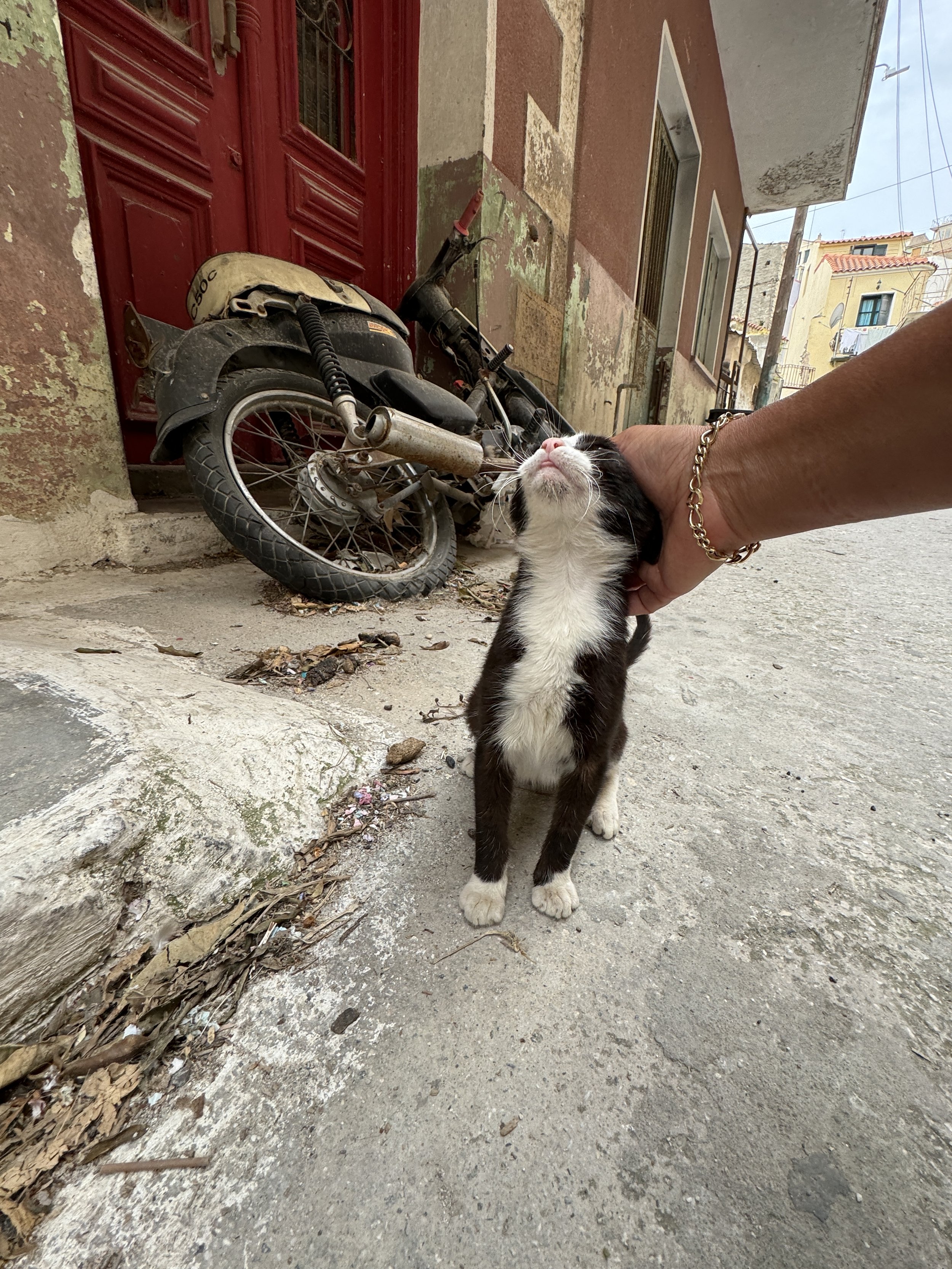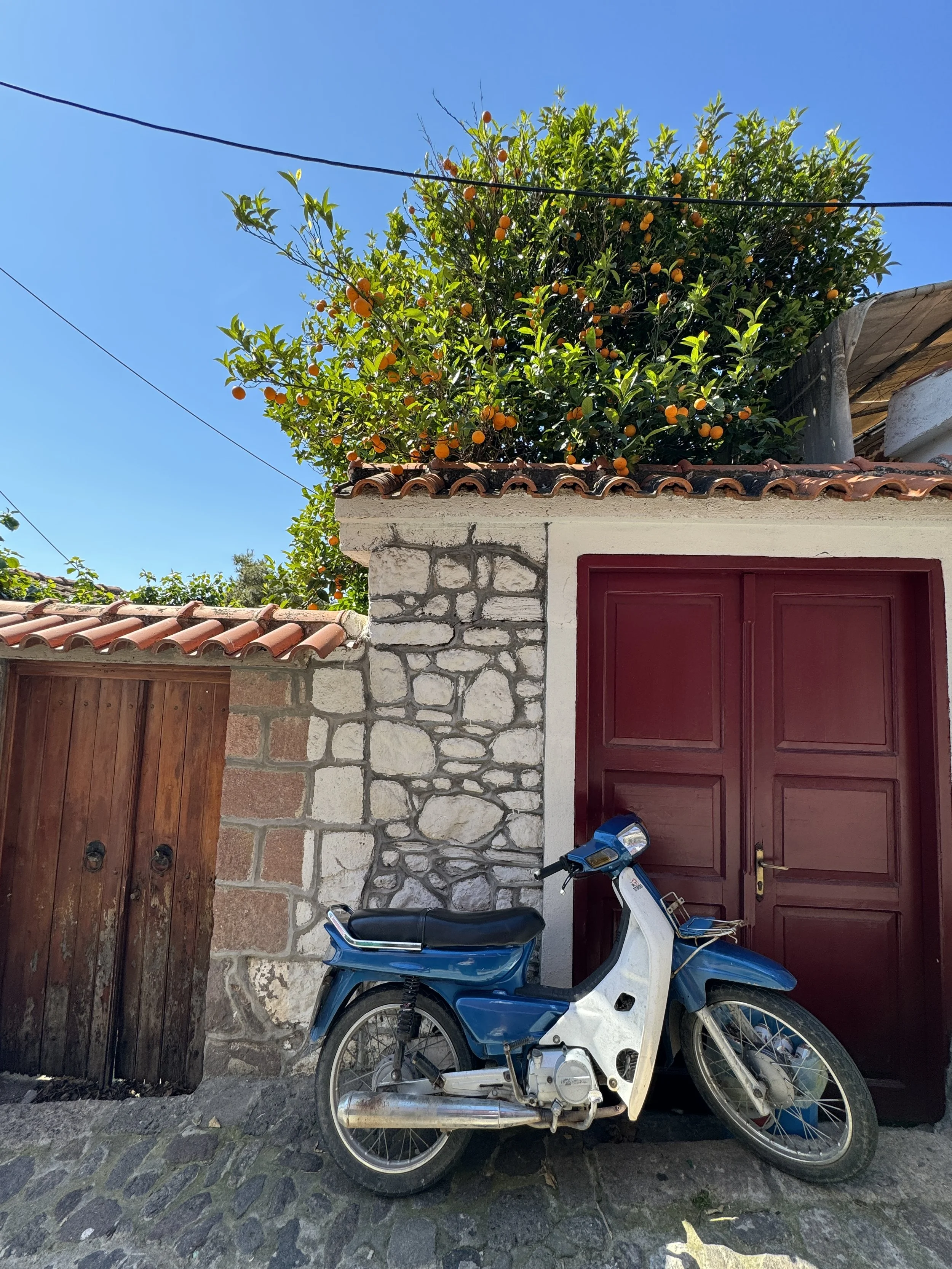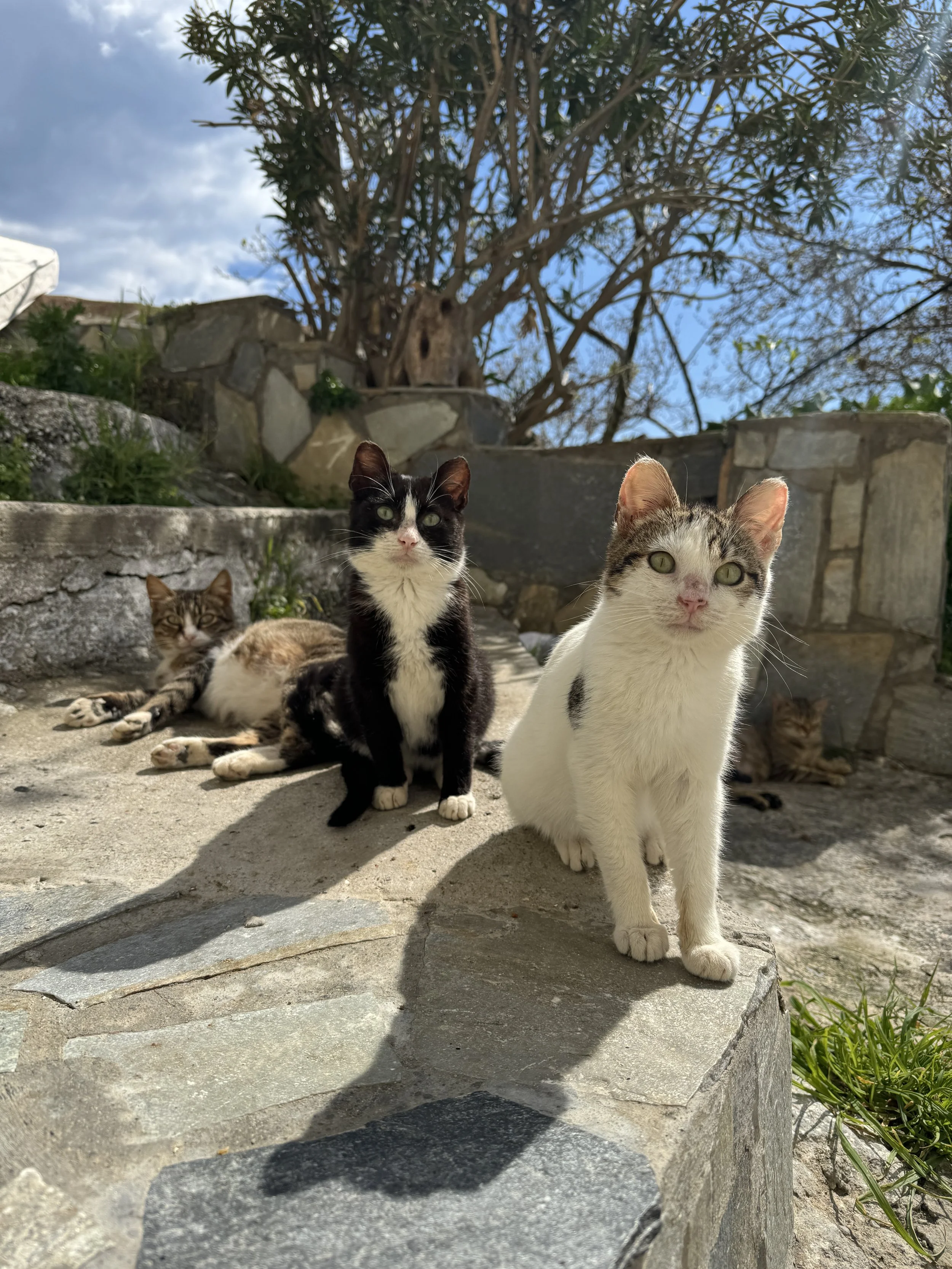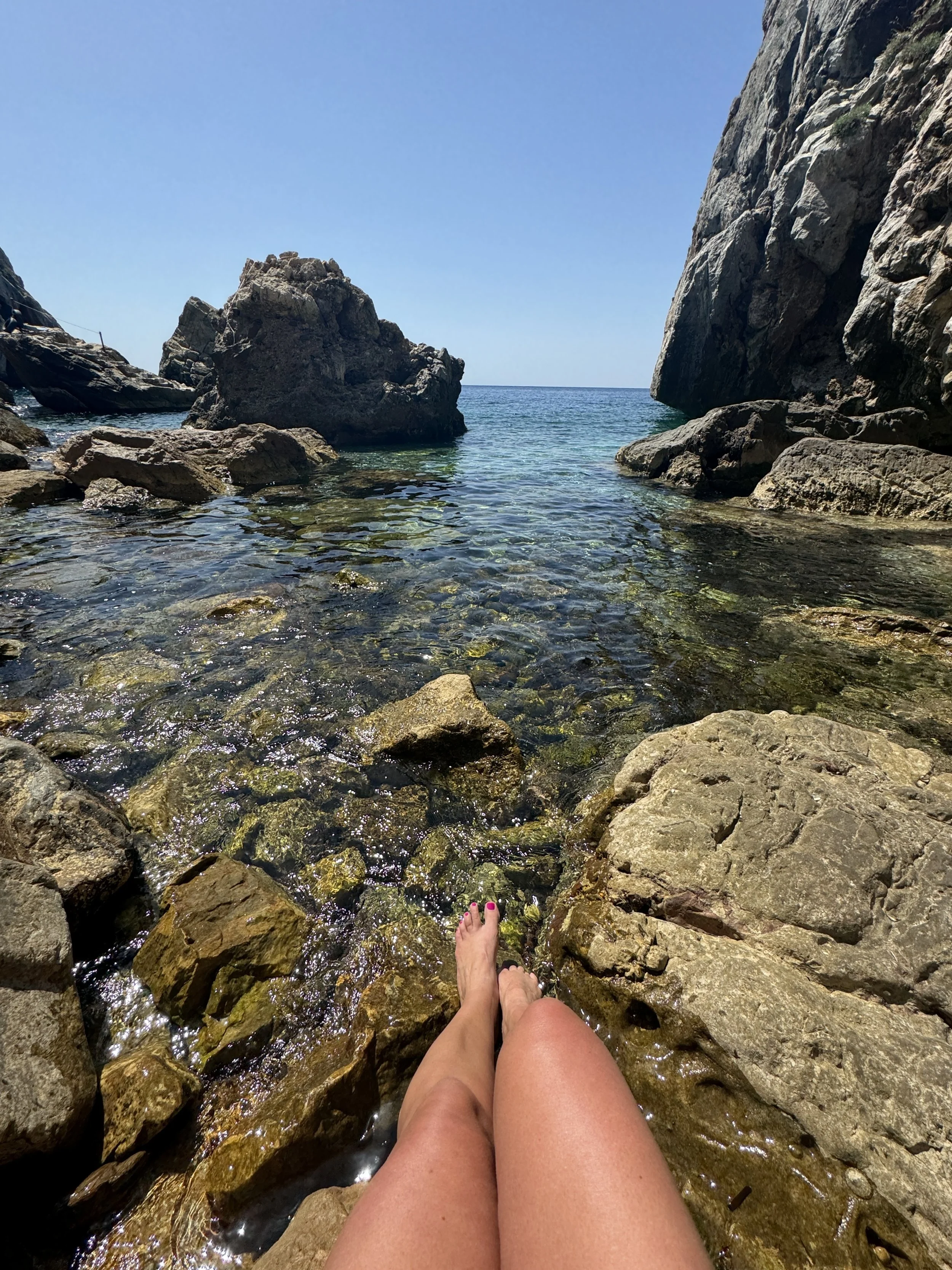Siga, Siga (Slowly, Slowly)
How I Moved Across the World and Haven’t Written Much
Plomari Harbor, Lesvos, Greece (photo: Rose Cameron)
For the past few months I’ve sat in the sun and let the Aegean heat seep into my skin, through my blood and into my bones. My mind found peace watching the leaves push through the hard branches on the tree out front as winter turned to spring. The silly cats winding around my legs. The clouds surfing the sea between our village and Chios and Türkiye in the distance. I watched the yellow-throated finches thrush and flit in the branches with newly unfurling foliage. Then the swallows came, sailing across the sky and shooting into an open terracota tile on the corner of the house. The doves arrived after, cooing mindlessly from morning until night — one loves to sit atop the light post outside my art studio. The laundry twists and waves on the line in the wind. The sun seeps into that, too. These are the things that make up the day.
Time slows down and almost unwinds. Siga siga, as the Greeks say. Slowly, slowly. To rush anything is to ruin everything. How can you enjoy your breakfast if you are mindlessly devouring it? How can you be here, when you are thinking about tonight and tomorrow? Everything moves at an appropriate speed to allow coffee with friends to stretch from 30 minutes to an hours long conversation. Parents have time to pick up kids from school and everyone goes home at 2:00 pm and has lunch with family or does a load of laundry or prepares dinner. There is always time to visit five different shops for their unique specialities instead of one massive supermarket.
Daily life is easier and substantially harder — if we want food or water or to take the trash out, it involves a journey. Shoes, a backpack or the rolling cart. Up and down exceedingly steep hills, uneven cobblestones, seemingly infinite stairs. If it is raining, you are wet. If it is sunny, you are sweating. Forget about the mail. Forget about Amazon deliveries. I can only buy what I am sure I can carry. I have heard there is a post office here but I haven’t sorted it out yet to send mail. There is a stationary & travel store where you can receive and possibly send packages via DHL. The man there said if they know you, they will call you if you get something but only if you have a Greek telephone number. If not, they will try to find someone who knows you to bring it to you, while it sits. In summer you may get a phone call that the truck is in the town square and you have one hour to come get your package from the pile of boxes — you may have to simply be in town at the right time to see the guy pull up. Lacking a house number and a street name we live at, “The house where Panagiotis used to live, who rides his bike and owned the Tavern by the sea, but now lives in Mytilini”. If that fails we add, “We live by Zaharoula who has the yellow house but we are at the top of the stairs.” When that doesn’t work we have to meet them at the big plane tree in Platanos, the one that proudly bears the sign of it’s origin date — 1813, from when the town was established, and walk them up.
I have learned that I don’t really need mail that badly and that if I want something I don’t have, I’m reminded I will work for it. I pulled a tendon in my foot earlier this week and my partner is riding his bicycle to the big city an hour away to get me a boot to keep it from further injury. He’s a fantastic cyclist, but that is the way of things here. We don’t have a car and we haven’t picked up our scooter from our friends garage this visit. I have learned how important community is to me — something I didn’t grow up with and didn’t know I needed. There is a deep sense of comfort that comes with familiar faces as we walk through town. We say hello to the butcher, to the leatherworker, the carpenter, the servers, the shopkeepers, the jeweler and his cat, the couple that owns the guns/plants/pet food store and the lady who sits outside of her flower shop. As the weather warms up and the old yayas come sit out on their chairs near Serafino’s in the evening — I am looking forward to surprising them by knowing how to say, “How are you?” and “I am well, thank you.” They have this twinkle and spark that’s both playful and a bit sassy, as if they are reminiscing to when they held hands with their lovers on the walk to town at night.
Life can be a bit brutal here. When we arrived in March we had three new to us kittens. Sickly but surviving the late winter, they huddled and played on our porch. We fed them back to health, giving them a warm box to shelter in and enough food to fatten them up turning them from wheezy sacks of bones to chunky grasshopper catchers. They still struggled with sneezes and runny noses and raspy lungs — a respiratory disease in little bodies is hard to recover from without proper care. We don’t have veterinary services here, nor a car, and catching the cats can be tricky at best. Casper fell ill fast, he was gone within a few days of his final sickness. Cloak, my lovers favorite kitten, started struggling with his congestion. We tried to catch him and feed him, but he’d wriggle and run away, stumbling into bushes unable to see clearly as his eyes were a mess. He would come back every day, knowing we could help him, but unable to let us. Finally one day, as we head down to town, he died. We wrapped him in a sweater we found and laid him to rest. That is just the way of things here — you do the best you can with what you have — at home, in life, with love, for animals.
I will spend more time writing on the past few months — life feels like a handful of polaroids, tossed on an old wooden desk. Here, we are laughing and making up stories about people we don’t know yet. Here, we let the sea carry us around the bend of the cove. Here, we didn’t know that cats name yet, and then this year, we do. Look at this funny one of us in the castle, the things you whispered would make anyone else blush. Living abroad strips the outer coverings from the bone — we fancy ourselves so unique and separate from the other. Yet mothers call after wayward daughters heading out to see friends, too-tight tank tops hidden under baggy sweatshirts. Siblings have silly squabbles and little boys ride their bicycles into car fenders while yelling back over their shoulders at friends. College boys with t-shirts stretched over toned bodies eyeball girls who strut past pretending they don’t notice. Old men knock back ouzo and laugh recalling stories of decades past. When we take away the things that separate us — we find that our bones are made in the same fashion, our blood pumps back and forth through similar hearts and familiar veins. We fear and love and fight and fail. We are all doing the best we can with what we have.








